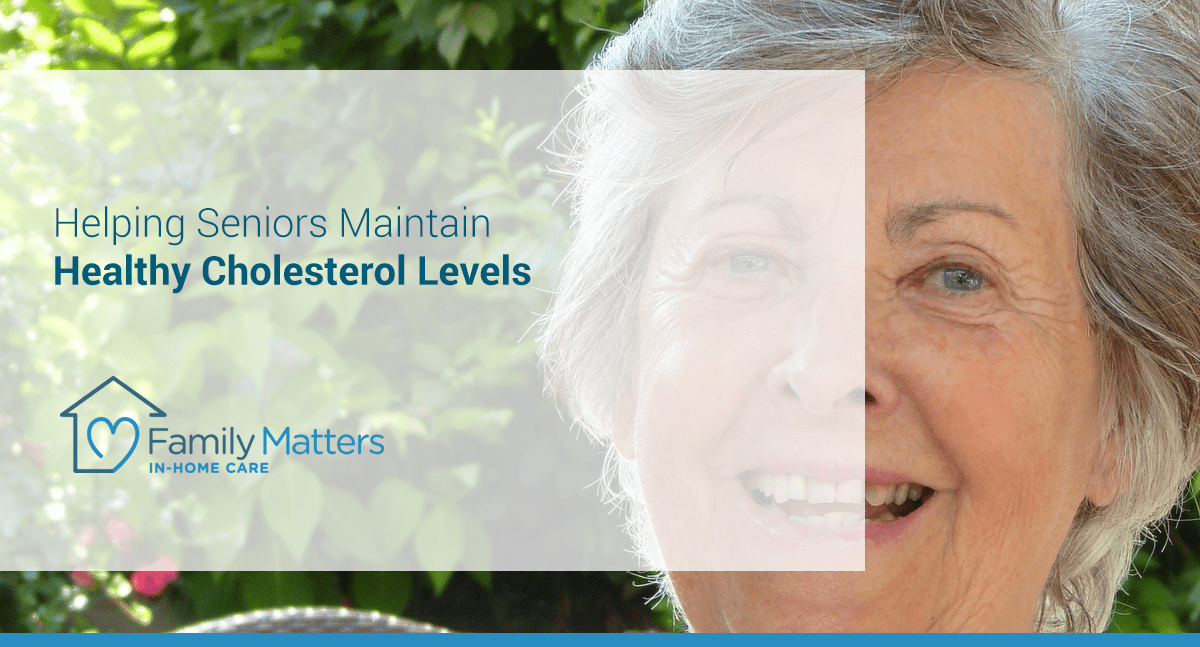
Helping Seniors Maintain Healthy Cholesterol Levels
Cholesterol levels can be a source of stress for seniors. Here’s what seniors and their loved ones need to know.
About 37 percent of U.S. adults have a higher than recommended LDL cholesterol level. Since this can increase risk of heart disease or stroke and seniors are already at higher risk of such health problems, it’s important for aging individuals to understand cholesterol.
What Cholesterol Is All About
Although many people think of cholesterol as something negative to avoid, cholesterol is actually a natural substance the body makes on its own. Cholesterol helps cells make hormones, digest food, and more. Besides the cholesterol your body makes, you can also consume cholesterol in eggs, meat, and other foods.
There are three types of cholesterol doctors measure:
- High Density Lipoprotein (HDL)
- Low Density Lipoprotein (LDL)
- Triglycerides
HDL is “good” cholesterol because its function is basically to clear out LDL cholesterol, which can build plaque up in the arteries. Triglycerides can also cause harmful build up affecting the heart.
When doctors give patients their “cholesterol level” findings, high HDL numbers are encouraging. High LDL and/or triglyceride numbers are what is commonly called “high cholesterol” and increase risk of heart disease.
Risks Associated with Poor Cholesterol Levels
The consequences of having too much LDL cholesterol include:
- Clogged arteries
- Increased risk of heart disease
- Higher risk of stroke
- Reduced function of the cardiovascular system
Other Heart Disease Risk Factors
Besides high cholesterol, other risk factors for heart disease among seniors include:
- Race/ethnicity
- Smoking
- Conditions like diabetes or obesity
- Lack of physical activity
- Genetics
- High blood pressure
How to Manage Cholesterol Levels
Seniors tend to be at an elevated risk of heart disease simply because of the aging process. When a senior also has high cholesterol, their heart disease risk increases. It is important for seniors to manage their cholesterol levels in order to keep arteries clear and functional.
Here’s how cholesterol can be managed:
Medication
There are a few medications that can help lower bad cholesterol levels and increase HDL. The most common medications for this are called statins.
Dietary Changes
Since cholesterol levels can be affected by what you eat, seniors with high LDL or triglycerides levels should:
- Avoid unhealthy fats
- Eat healthier fats
- Get plenty of fiber
- Reduce sugar intake
- Reach a healthy weight
Exercise Regularly
The body can manage conditions like high cholesterol better if you are physically active. Exercise stimulates many important natural processes. Simply taking walks is a great start.
Seniors can often have high cholesterol without showing any symptoms. Encourage seniors to visit doctors regularly and receive recommended blood tests to check cholesterol levels, especially if they are at elevated risk due to obesity or a poor diet.
If you or your family member is considering in-home care as part of a plan to age in place, contact Family Matters In-Home Care today for a free consultation. Our team is dedicated to supporting your family and helping older adults enjoy life in the comfort of their own home for as long as possible.
Some of the services offered by Family Matter In-Home Care include: Alzheimer’s & Dementia Care, Bed & Wheelchair Transfer Assistance, Companionship, Housekeeping & Meal Preparation, Personal Care, Recovery Care, and Transportation.
Serving the San Francisco Bay Area and Greater San Diego, Family Matter In-Home Care has offices throughout California including: Campbell, CA, Roseville, CA, San Marcos, CA, and San Mateo, CA.
Sources:
- https://cdn2.hubspot.net/hubfs/1708580/Marketing%20Monthlies/PDFs%20from%20Windfarm%20Marketing/0319-Cholesterol-RGB.pdf
- https://www.cdc.gov/cholesterol/facts.htm
- https://medlineplus.gov/cholesterol.html
- https://www.medicinenet.com/cholesterol_management/article.htm
- https://www.webmd.com/heart-disease/risk-factors-heart-disease
- https://www.webmd.com/cholesterol-management/guide/steps-to-reduce-cholesterol
